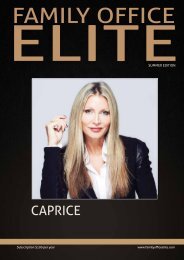Family Office Elite Spring_16
Family Office Elite Magazine, the wealthiest audience in the world. Family Office Elite Magazine is a very high class bespoke publication and a porthole to the ultra-wealthy family offices and UHNWI sectors. The magazine includes editorials from recent events and experts from the ultra-wealthy Family Office community.
Family Office Elite Magazine, the wealthiest audience in the world.
Family Office Elite Magazine is a very high class bespoke publication and a porthole to the ultra-wealthy family offices and UHNWI sectors. The magazine includes editorials from recent events and experts from the ultra-wealthy Family Office community.
Create successful ePaper yourself
Turn your PDF publications into a flip-book with our unique Google optimized e-Paper software.
Some investors focus only on projects, not impact<br />
investing funds. According to Tatiana Alexandra Ward<br />
of Rex Clement Capital in Hong Kong, “It’s much<br />
harder to find suitable, diligence worthy projects, but<br />
the families I work with appreciate the more tangible<br />
impact of owning a real asset—be that a wind farm, a<br />
hydro plant or a training facility in rural Africa.”<br />
Impact investing as a trend is in its early days, and it<br />
can be a complicated marketplace. There are barriers<br />
to entry, among them, the definition. According to<br />
Lisa Parker, vice president of philanthropic services<br />
at Whittier Trust Company, “The term itself means<br />
different things to different people. Some view it<br />
as avoiding “sin stocks” and investing in companies<br />
with positive ESG scores (Environmental, Social,<br />
Governance). Others see it as investing in much<br />
different terms—for example, funding social ventures<br />
in developing countries. Some expect market returns;<br />
others are not looking for significant returns but simply<br />
want their investable funds to work towards their<br />
mission alongside their charitable contributions. There<br />
are cases where impact investing is returning as much<br />
if not more than traditional market investing, so it is not<br />
as straight-forward as one might think.”<br />
Beyond finding a common definition of impact investing,<br />
other challenges include: finding opportunities,<br />
which can be rare, and how to go about measuring<br />
social returns, which can be a long and expensive<br />
process. Finding projects that match a family’s cultural<br />
preferences can add even more complexities.<br />
While the challenges to impact investing are real, they<br />
are not insurmountable. Most philanthropic families<br />
focus on traditional philanthropy first, and dabble in<br />
impact investing on the side. “The families we work<br />
with aren’t saying ‘let’s pull our philanthropy and do<br />
impact investing,’,” said Cafferkey. “Rather, they see<br />
impact investing as a way to leverage more resources<br />
for the social good, and make their philanthropic money<br />
work harder.”<br />
<strong>Family</strong> offices can play an important role in bringing<br />
scale to the impact-investing sector in the coming years.<br />
The most successful impact investments are those<br />
in which the family is fully engaged—not necessarily<br />
from a time perspective, but from the actual project/<br />
investment perspective. For family offices exploring<br />
the possibility of getting involved in impact investing,<br />
here are five steps to start:<br />
1. Decide why impact investing is for you. Write a list of<br />
what matters to you individually and as a family. Where<br />
is there overlap with other family members? Rule out<br />
whether exclusive investment or philanthropy would<br />
be more appropriate or effective. Why or why not?<br />
2. Engage an advisor. An advisor specializing in impact<br />
investing can be brought in before, during or after the<br />
narrowing process of what to focus on and why. When<br />
identifying an advisor, take your time. Rely on personal<br />
recommendations and a comparison of fee structure,<br />
type of opportunities in which sector, region, size of the<br />
organization, etc.<br />
3. Do your research. If a particular social issue is<br />
motivating you, research that issue (or engage others<br />
to do so for you) so that you understand the social<br />
element and the gaps in that marketplace. By building<br />
your knowledge of the social challenge, you will be<br />
better able to identify opportunities for the largest<br />
social impact in that area.<br />
4. Engage with others. If financial innovation and<br />
potential returns are your primary motivation, look to<br />
engage with other investors, understand the common<br />
challenges, and talk with others who are already<br />
involved in impact investing.<br />
5. Learn by doing. Make a small number of initial<br />
investments in areas of interest, viewing them as<br />
learning opportunities. Within impact investing, many<br />
individuals have become involved by initially putting<br />
to one side a small part of their philanthropic portfolio<br />
to experiment with funds for which they have little<br />
expectations of returns.<br />
To learn more about impact investing in family offices,<br />
read the report Philanthropy in the <strong>Family</strong> <strong>Office</strong>: A<br />
Global Perspective, June 2015, produced by Hammer<br />
& Associates and the Global <strong>Family</strong> <strong>Office</strong> Community.<br />
Download the report at www.suzannehammer.com.<br />
About Hammer & Associates<br />
Hammer & Associates is a full-service firm that works<br />
with a select number of family philanthropies. We form<br />
deep, long-term relationships with foundations, family<br />
offices, and the advisors who serve them, helping<br />
philanthropic individuals and families pair their<br />
passion. .<br />
WWW.FAMILYOFFICEELITE.COM<br />
22



